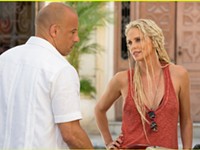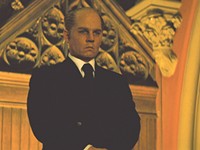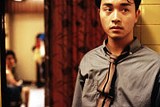[
{
"name": "500x250 Ad",
"insertPoint": "5",
"component": "15667920",
"parentWrapperClass": "",
"requiredCountToDisplay": "1"
}
]
Hong Kong auteur Wong Kar-wai obviously knows what it is to yearn. Be it a longing for someone or something, or even the wish to be free from such an unbearable desire, Wong's films are infused with a melancholy ache that other filmmakers don't convey nearly as well. And movies like that are my kryptonite.
1991's stunning Days of Being Wild (Saturday, March 5, 8 p.m., Dryden Theatre, 271-4090) is Wong's second feature (the first being 1988's As Tears Go By). Days made a killing at the Hong Kong Film Awards the year it was released, with its French New Wave sensibility and its future Who's Who of Asian Cinema cast, but its few initial American screenings were hampered by jarringly awful subtitling, which have been spruced up for its recent reissue.
Like Wong's most recent (and best-known) film, In the Mood for Love, Days is set in the lush Hong Kong of the early '60s. Yuddy (the late Leslie Cheung) is a two-bit hood with the face of a matinee idol and the attention span of a five-year-old boy. And like any five-year-old, he wants what he can't have, and once he's gotten it, he covets something else. This is best embodied by Yuddy's relationships with the fairer sex, starting with the quiet Lizhen (Maggie Cheung, Hero), then the shrill showgirl Mimi (Carina Lau). The root of his problems is undoubtedly the love-hate bond with his adoptive mother (Rebecca Pan), an alcoholic dragon lady cliché who bankrolls him but refuses him what he most wants: The identity of his birth mother.
The devastated Lizhen is befriended by a cop called Tide (Andy Lau, House of Flying Daggers) as she wanders around near Yuddy's flat, unable to cope with their breakup. And Yuddy and Tide will later meet as the cop changes careers and Yuddy forsakes all the women in his life --- including the spiteful Mimi --- and hits the Philippines in search of his mom.
Cinematographer Christopher Doyle has captured movies as diverse as Zhang Yimou's Hero, Barry Levinson's Liberty Heights, and Gus Van Sant's Psycho, but his style is a hallmark of every one of Wong's films. In Days he showcases a Hong Kong bathed in neon and rain and employs some inventive point-of-view depictions as well as a great tracking shot into a seedy Filipino club and an exquisite frame of Yuddy and Lizhen tangled in sheets as they discuss their relationship. Doyle's images are perfectly complemented by the twangy tropical guitar score.
Leslie Cheung would go on to star in two more films for Wong Kar-wai (Ashes of Time, Happy Together) and was ostensibly his on-screen alter ego (he would be replaced by Hero's Tony Leung, who has a tiny part in Days). Cheung also worked with John Woo (A Better Tomorrow, Once a Thief) and was probably the only man beautiful enough to distract the viewer from Gong Li (Temptress Moon; Farewell, My Concubine). Sadly, Cheung took his own life in April of 2003, but Days fortunately memorializes this dazzling talent at the peak of his powers.
Wanting something can lead to some irrational actions. But feeling as though you deserve it can incorporate resentment into that view of entitlement and often adds a level of desperation to already rash behavior. In the inspired-by-a-true-story The Assassination of Richard Nixon (opens at the Little Theatre on Friday, March 4), Sam Bicke (Sean Penn) is the kind of man whose frustration with life comes from the fact that what he feels should be coming to him just won't.
It's 1974, and Bicke is embarking on a new career as an unsuccessful salesman with a ball-busting boss (the underused Australian character actor Jack Thompson). Bicke has entrepreneurial dreams of his own in the form of a tire store on wheels that he hopes to open with his pal Bonny (go-to guy Don Cheadle). Bicke is also dealing with his failed marriage to Marie (Naomi Watts), a waitress whose patience with him is wearing thin.
As these pressures compound --- trouble at work, red tape for the business loan, the arrival of his divorce decree --- Bicke starts to crack, questioning why a decent man like himself can't catch a break. He directs his rage at our 37th president, whom his boss calls "the greatest salesman" in light of the fact that Nixon got re-elected by vowing to end the war in Vietnam --- the same promise he made the first time. In Bicke's eyes, Nixon typifies the man who gets what he clearly doesn't deserve, so he makes plans to hijack a plane and crash it into the White House.
Through no fault of the always-capable Sean Penn, our hero is surprisingly underdeveloped. It's difficult to sympathize with a person whose logic is so misguided, and this adversely affects the rest of the movie. But Assassination does feature a nearly unrecognizable Michael Wincott, who normally uses his gravelly voice to play bad guys, as Julius, Bicke's Orthodox brother, as well as Mykelti Williamson (Forrest Gump, TV's Boomtown), playing the local Black Panther leader to whom Bicke suggests a name change to the Black Zebras in order to increase enrollment.
My rational mind knows that no matter what I say to a character in a movie, he's not going to revamp his thinking. In real life you might have a shot at counseling someone who is behaving strangely, but watching this movie has driven home the point that reasoning with people on the big screen is futile.
Latest in Movie Reviews
More by Dayna Papaleo
-

Festival Preview: ImageOut 2017
Oct 4, 2017 -

Film review: 'The Fate of the Furious'
Apr 17, 2017 -

Rat tales
Sep 23, 2015 - More »






